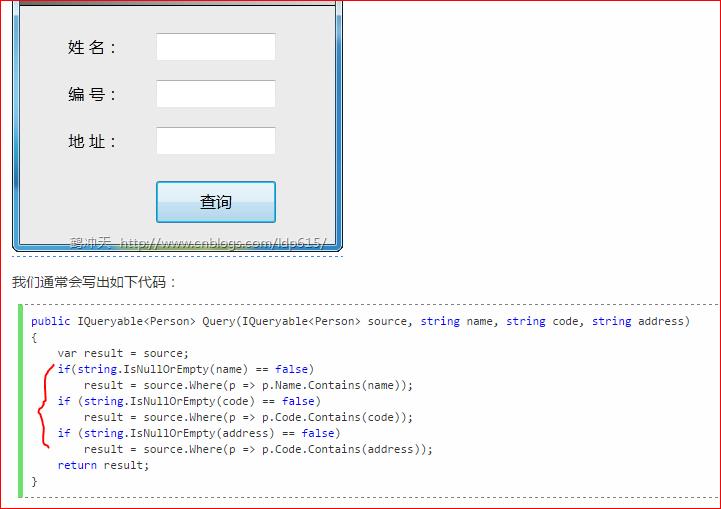ABP框架源码中的Linq扩展方法
Posted 海阔天空XM
tags:
篇首语:本文由小常识网(cha138.com)小编为大家整理,主要介绍了ABP框架源码中的Linq扩展方法相关的知识,希望对你有一定的参考价值。
文件目录:aspnetboilerplate-dev\\aspnetboilerplate-dev\\src\\Abp\\Collections\\Extensions\\EnumerableExtensions.cs
using System; using System.Collections.Generic; using System.Linq; namespace Abp.Collections.Extensions { /// <summary> /// Extension methods for <see cref="IEnumerable{T}"/>. /// </summary> public static class EnumerableExtensions { /// <summary> /// Concatenates the members of a constructed <see cref="IEnumerable{T}"/> collection of type System.String, using the specified separator between each member. /// This is a shortcut for string.Join(...) /// </summary> /// <param name="source">A collection that contains the strings to concatenate.</param> /// <param name="separator">The string to use as a separator. separator is included in the returned string only if values has more than one element.</param> /// <returns>A string that consists of the members of values delimited by the separator string. If values has no members, the method returns System.String.Empty.</returns> public static string JoinAsString(this IEnumerable<string> source, string separator) { return string.Join(separator, source); } /// <summary> /// Concatenates the members of a collection, using the specified separator between each member. /// This is a shortcut for string.Join(...) /// </summary> /// <param name="source">A collection that contains the objects to concatenate.</param> /// <param name="separator">The string to use as a separator. separator is included in the returned string only if values has more than one element.</param> /// <typeparam name="T">The type of the members of values.</typeparam> /// <returns>A string that consists of the members of values delimited by the separator string. If values has no members, the method returns System.String.Empty.</returns> public static string JoinAsString<T>(this IEnumerable<T> source, string separator) { return string.Join(separator, source); } /// <summary> /// Filters a <see cref="IEnumerable{T}"/> by given predicate if given condition is true. /// </summary> /// <param name="source">Enumerable to apply filtering</param> /// <param name="condition">A boolean value</param> /// <param name="predicate">Predicate to filter the enumerable</param> /// <returns>Filtered or not filtered enumerable based on <paramref name="condition"/></returns> public static IEnumerable<T> WhereIf<T>(this IEnumerable<T> source, bool condition, Func<T, bool> predicate) { return condition ? source.Where(predicate) : source; } /// <summary> /// Filters a <see cref="IEnumerable{T}"/> by given predicate if given condition is true. /// </summary> /// <param name="source">Enumerable to apply filtering</param> /// <param name="condition">A boolean value</param> /// <param name="predicate">Predicate to filter the enumerable</param> /// <returns>Filtered or not filtered enumerable based on <paramref name="condition"/></returns> public static IEnumerable<T> WhereIf<T>(this IEnumerable<T> source, bool condition, Func<T, int, bool> predicate) { return condition ? source.Where(predicate) : source; } } }
WhereIf很好用:
public GetTasksOutput GetTasks(GetTasksInput input) { var query = _taskRepository.GetAll().Include(t => t.AssignedPerson) .WhereIf(input.State.HasValue, t => t.State == input.State.Value) .WhereIf(!input.Filter.IsNullOrEmpty(), t => t.Title.Contains(input.Filter)) .WhereIf(input.AssignedPersonId.HasValue, t => t.AssignedPersonId == input.AssignedPersonId.Value); //WhereIf为Linq扩展方法,表示如果第一个表达式为true,则加第二个过滤条件
//这样就不需要用那么多个if()了 //排序 if (!string.IsNullOrEmpty(input.Sorting)) query = query.OrderBy(input.Sorting); else query = query.OrderByDescending(t => t.CreationTime); var taskList = query.ToList(); //Used AutoMapper to automatically convert List<Task> to List<TaskDto>. return new GetTasksOutput { Tasks = Mapper.Map<List<TaskDto>>(taskList) }; }
以前都需要这样写:

以上是关于ABP框架源码中的Linq扩展方法的主要内容,如果未能解决你的问题,请参考以下文章